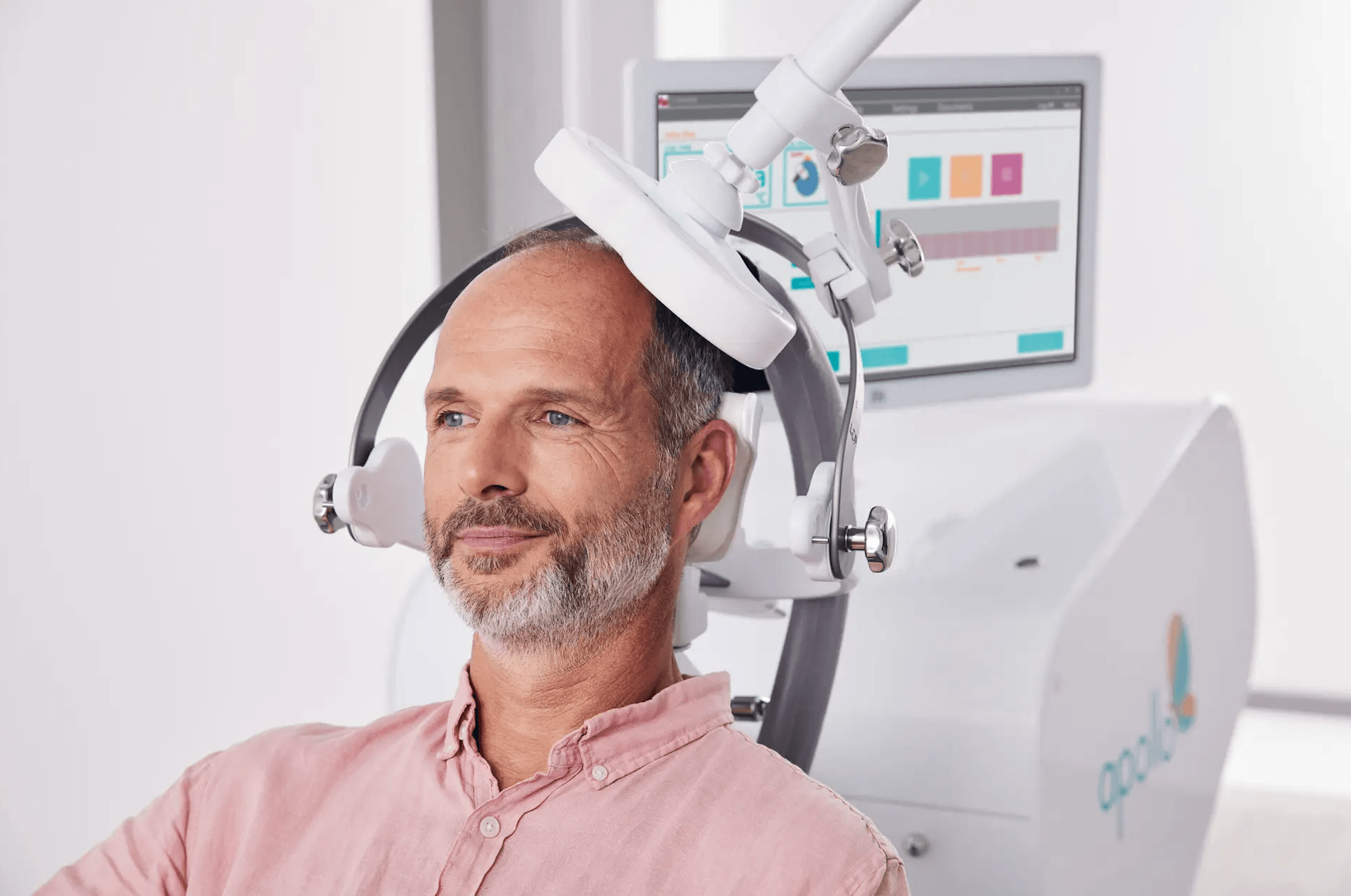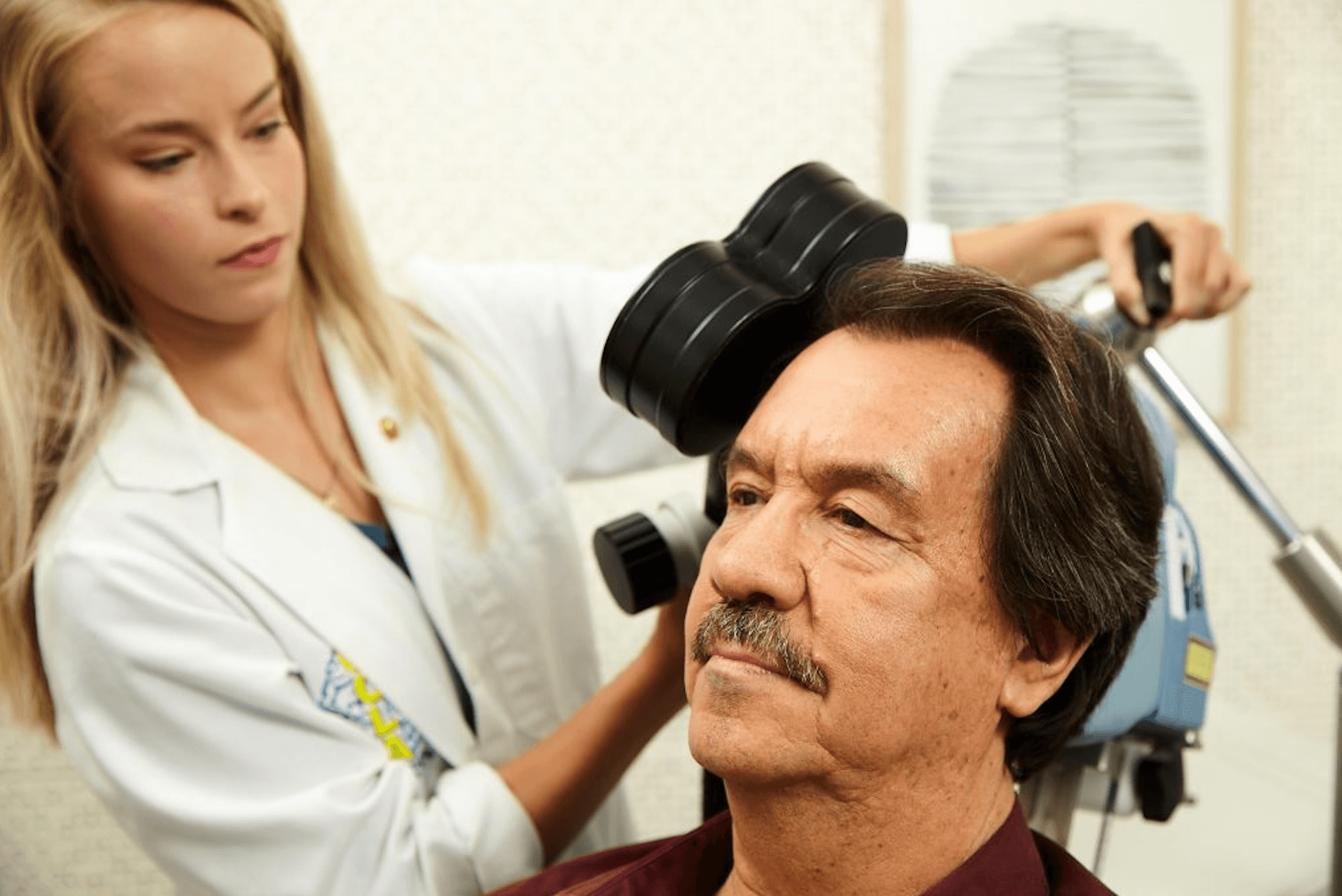TMS Therapy for Depression Services in Long Beach


Experience the benefits of TMS therapy in Long Beach. This non-invasive, FDA-approved treatment offers relief for depression when traditional methods fall short.
Depression can feel overwhelming, affecting every aspect of your life and those around you. When traditional treatments fail, hope may seem out of reach. At The Forge Recovery Center, we understand the challenges of mental health struggles and are committed to providing innovative solutions. One such breakthrough is Transcranial Magnetic Stimulation (TMS)—a non-invasive, FDA-approved treatment designed to help individuals struggling with depression. The benefits of TMS therapy include minimal side effects, increased effectiveness for treatment-resistant depression, and improved overall well-being. In this article, we will explore how TMS therapy works, its advantages, and why it may be the right option for you.
Understanding TMS Therapy

Transcranial magnetic stimulation (TMS) is a non-invasive, drug-free treatment for individuals struggling with depression, particularly those who have not found relief with traditional treatments like medication or therapy. TMS works by using magnetic pulses to stimulate specific areas of the brain responsible for mood regulation. This stimulation helps to restore normal brain activity, reducing symptoms of depression over time.
Unlike electroconvulsive therapy (ECT), which induces seizures, TMS does not require anesthesia, has minimal side effects, and allows patients to resume their daily activities immediately after treatment.
How Does TMS Work?
TMS therapy involves placing a specialized electromagnetic coil near the patient’s forehead, targeting the prefrontal cortex—an area of the brain linked to mood control. The device delivers repeated pulses of magnetic energy, which activate underactive nerve cells associated with depression. Over multiple treatment sessions, this stimulation rebuilds neural pathways, leading to lasting improvements in mood, focus, and overall mental well-being.
The History and FDA Approval of TMS Therapy
TMS therapy has been researched for decades, with its origins tracing back to the 1980s when scientists first explored the effects of magnetic fields on brain activity. By the early 2000s, clinical trials demonstrated TMS as an effective treatment for major depressive disorder (MDD), particularly in patients who had not responded to antidepressants.
In 2008, the U.S. Food and Drug Administration (FDA) approved TMS therapy for depression, marking a significant advancement in mental health treatment. Since then, continued research has expanded its applications, with the FDA approving TMS for obsessive-compulsive disorder (OCD) in 2018 and further studies exploring its potential for conditions like anxiety, PTSD, and addiction recovery.
Why TMS Matters for Depression Treatment
For individuals battling depression, especially those who haven’t found relief through conventional methods, TMS therapy offers a new path to recovery. At The Forge Recovery Center, we integrate TMS into personalized treatment plans, ensuring that every patient receives the most effective care tailored to their unique needs.
Benefits of TMS Therapy

For individuals struggling with depression, especially those who have not found relief through medication or traditional therapy, Transcranial Magnetic Stimulation (TMS) offers a breakthrough, non-invasive treatment option. With minimal side effects and high success rates, TMS provides a safe and effective alternative for those seeking lasting relief. Here are some of the key benefits of TMS therapy:
1. Non-Invasive Treatment
Unlike more invasive procedures, TMS therapy does not require surgery, anesthesia, or sedation. Patients remain awake and fully alert throughout their sessions, which are performed in an outpatient setting. This makes TMS an attractive option for those looking for effective treatment without the risks or recovery time associated with more intensive interventions.
2. Minimal Side Effects
Traditional antidepressants often come with a range of unwanted side effects, including weight gain, fatigue, sexual dysfunction, and digestive issues. TMS therapy, on the other hand, has minimal systemic side effects, with the most common being mild scalp discomfort or headache after treatment—both of which typically subside as the body adjusts.
3. Effective for Treatment-Resistant Depression
Many individuals suffering from depression do not respond to first-line treatments like medication or psychotherapy. Studies show that TMS therapy is particularly effective for treatment-resistant depression, providing relief for patients who have tried multiple medications without success.
4. Improved Quality of Life
Patients who undergo TMS therapy often report experiencing enhanced mood, better sleep patterns, increased energy levels, and a greater ability to focus. These improvements contribute to an overall higher quality of life, allowing individuals to engage more fully in their personal and professional lives.
5. Long-Lasting Results
Unlike medications, which require ongoing use and may lose effectiveness over time, TMS therapy provides long-lasting relief from depression symptoms. While some patients may need maintenance sessions, many experience significant mood improvements for months or even years after completing treatment.
6. Drug-Free Alternative
TMS offers a medication-free option for depression treatment, making it ideal for individuals who either cannot tolerate antidepressants or prefer a holistic, non-pharmaceutical approach to mental health care.
7. Safe and FDA-Approved
TMS therapy has been extensively studied and approved by the FDA for the treatment of major depressive disorder (MDD) and obsessive-compulsive disorder (OCD). Its safety profile makes it a reliable choice for those seeking clinically backed, evidence-based treatment.
8. Complements Other Therapies
At The Forge Recovery Center, we integrate TMS therapy into personalized treatment plans that may include counseling, psychotherapy, and holistic wellness approaches. This comprehensive care model enhances the effectiveness of treatment and supports long-term mental health recovery.
For those looking for a safe, non-invasive, and highly effective way to manage depression, TMS therapy may be the solution. At The Forge Recovery Center, we are committed to offering innovative treatments that empower individuals on their journey to healing.
Are You Struggling with Mental Health or Addiction?
We Can Help. Call Us Now!
CALL: 877-839-1772
TMS Therapy Procedure

At The Forge Recovery Center, we take a personalized and structured approach to TMS therapy to ensure optimal results for each individual. The TMS therapy process involves three key stages: an initial consultation, treatment sessions, and post-treatment care. Here's what you can expect:
1. Initial Consultation: Assessing Suitability for TMS
Before beginning TMS therapy, patients undergo a comprehensive evaluation with a mental health professional to determine whether TMS is the right fit for their condition. This assessment includes:
A review of medical history, including past depression treatments and medication use.
A discussion of symptoms, severity, and treatment goals to ensure TMS is appropriate.
A physical and neurological evaluation to check for any contraindications, such as metal implants or seizure history.
If TMS therapy is deemed suitable, our team will develop a customized treatment plan tailored to the patient’s specific needs.
2. Treatment Sessions: What to Expect During TMS Therapy
TMS therapy is a non-invasive outpatient procedure, meaning there is no need for anesthesia or hospitalization. Each session follows a structured process:
The patient sits comfortably in a treatment chair while a specialized electromagnetic coil is placed on their scalp, targeting the prefrontal cortex.
Magnetic pulses are delivered to stimulate neural activity, helping to restore normal brain function.
The session lasts approximately 20 to 40 minutes, during which patients remain awake and can read, listen to music, or relax.
TMS treatments are typically administered five days a week for four to six weeks, depending on the individual’s response to therapy.
Most patients experience gradual improvements in mood, energy levels, and overall mental health as treatment progresses.
3. Post-Treatment Care: Monitoring Progress and Follow-Up
After completing a full course of TMS therapy, our team provides ongoing support to ensure long-term success. Post-treatment care includes:
Regular follow-up appointments to monitor improvements and address any lingering symptoms.
Additional booster sessions if needed to maintain the benefits of TMS therapy.
Integration with other therapeutic approaches, such as counseling, lifestyle adjustments, and wellness programs, to enhance long-term recovery.
At The Forge Recovery Center, we are committed to delivering high-quality, personalized TMS therapy that helps individuals reclaim their lives from depression. If you or a loved one is struggling, our team is here to guide you through every step of the healing process.
Depression Holding You Back? We’re Here to Help
At The Forge Recovery Center, we are committed to providing cutting-edge, effective treatments like TMS therapy to help individuals struggling with depression reclaim their lives. If traditional treatments haven’t worked for you, TMS offers a safe, non-invasive alternative with lasting benefits. You don’t have to face this battle alone—our dedicated team is here to support you every step of the way. If you or a loved one is seeking relief from depression, reach out to us today and take the first step toward lasting recovery and a brighter future.
Are You Struggling with Mental Health or Addiction?
We Can Help. Call Us Now!
CALL: 877-839-1772





